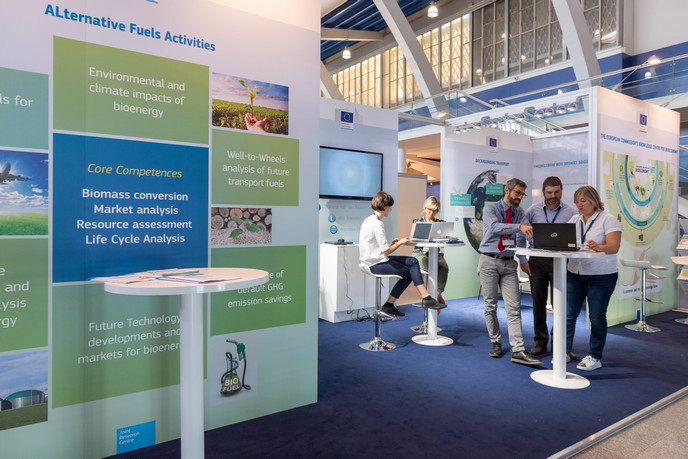Lifting the lid on biofuel for the transport sector, at EUBCE
Transport accounts for one third of the primary energy consumed in Europe and is responsible for around a quarter of the EU's greenhouse gas emissions (second to the energy sector). As such, the sector has a key contribution to make towards decarbonisation. Alternative fuels will be at the heart of this coming transition and the EUBCE 2019 conference in Lisbon afforded CORDIS the opportunity to learn more, directly from exhibitors, about their EU funded contributions. Biofuels for more sustainable transport With Europe’s transport sector currently 94 % dependent on oil, the EU’s new Renewable Energy Directive (RED 2) set the transport target of 14 % renewable sources by 2030. CORDIS caught up with members of the European Joint Research Centre (JRC), the coordinator of EUBCE’s technical programme and also responsible for calculating some of the values used to formulate the RED, to learn more. “The RED 2 gave a clear mandate to the transport sector and as it’s a very complex topic it allows for a wide set of solutions, it could be electricity for road mobility, biofuel for aviation, liquefied natural gas for maritime,” says Matteo Prussi, Energy Transport and Climate Project Officer of the JRC. As Mr Prussi explained, RED 2 is technology neutral, meaning that while it provides guidance it does not prioritise a particular pathway. Rather the market is left to select technologies after making the appropriate sustainability assessments weighing up likely economic, social end environmental impacts. “That’s why it is important for us to be here [at EUBCE] because this conference is not specific to one sector, or one argument, it really gives a wide perspective on a lot of topics where biomass can contribute,” says Mr Prussi. When it comes to biofuels, visiting the JRC stand reinforced the view that a step change still requires not only increased availability of the right feedstock at good prices, but that sustainability concerns be addressed. Sewage sludge into biofuels One EU-funded project exhibiting at EUBCE and working to overcome these challenges was tosynfuel. Using Thermo Catalytic Reforming (TCR) technology, tosynfuel converts sewage sludge (and other biomass) into biofuels and green hydrogen (from syngas) which are ready to be used in conventional combustion engines, without modification. It also produces biochar, which can be used to enrich soils. The system can accommodate any hard to treat organic waste which can’t be used for livestock or broken down using biological process. As Chris Tuck Managing Director at WRG Europe Ltd and working on tosynfuel outreach explains, “The system’s unique selling point is the robustness of the process in terms of the range of feedstock it can treat. The quality of the product is close to fossil fuel … as opposed to typical biofuels, like ethanol, which is not as easy to integrate into existing fossil fuel infrastructure.” With the pilot phase scaling up to process 500 kg of biomass for 50 litres of biofuel an hour, the reactor design now completed, the installation site in Germany is currently being prepared. “The point is not to replace 100 % of fossil fuels but to offer one solution as part of a larger portfolio ... remediating a waste product which otherwise has no inherent value,” Chris elaborates: “It’s a solution that can be rolled out to any location or scenario where you have low value waste – it could be sewage sludge, it could be plastics, it could be unsorted organic waste … best suited to problematic residues at the end of their life.” Added to which, as the plant is modular, larger plants could operate as hubs in areas with lots of waste, or the biofuel from lots of smaller units could be transported to a centralised location for distribution – reducing emissions and costs. With hundreds of plants across Europe capable of converting millions of tonnes of biogenic waste per year, to literally drive home the message, the project team are planning a biofuel powered car tour stopping to meet key influencers along the way. Watch this space! For more information, please see: event website
Countries
Portugal



